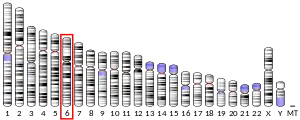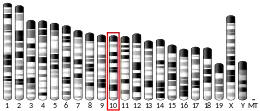RSPH4A
Radial spoke head protein 4 homolog A, also known as radial spoke head-like protein 3, is a protein that in humans is encoded by the RSPH4A gene.[5][6]
| RSPH4A | |||||||||||||||||||||||||
|---|---|---|---|---|---|---|---|---|---|---|---|---|---|---|---|---|---|---|---|---|---|---|---|---|---|
| Identifiers | |||||||||||||||||||||||||
| Aliases | RSPH4A, CILD11, RSHL3, RSPH6B, dJ412I7.1, radial spoke head 4 homolog A, radial spoke head component 4A | ||||||||||||||||||||||||
| External IDs | OMIM: 612647 MGI: 3027894 HomoloGene: 71779 GeneCards: RSPH4A | ||||||||||||||||||||||||
| |||||||||||||||||||||||||
| |||||||||||||||||||||||||
| |||||||||||||||||||||||||
| Orthologs | |||||||||||||||||||||||||
| Species | Human | Mouse | |||||||||||||||||||||||
| Entrez | |||||||||||||||||||||||||
| Ensembl | |||||||||||||||||||||||||
| UniProt | |||||||||||||||||||||||||
| RefSeq (mRNA) | |||||||||||||||||||||||||
| RefSeq (protein) | |||||||||||||||||||||||||
| Location (UCSC) | Chr 6: 116.62 – 116.63 Mb | Chr 10: 33.91 – 33.92 Mb | |||||||||||||||||||||||
| PubMed search | [3] | [4] | |||||||||||||||||||||||
| Wikidata | |||||||||||||||||||||||||
| |||||||||||||||||||||||||
Function
TRadial spoke head protein 4 homolog A appears to be a component the radial spoke head, as determined by homology to similar proteins in the biflagellate alga Chlamydomonas reinhardtii and other ciliates. Radial spokes, which are regularly spaced along cilia, sperm, and flagella axonemes, consist of a thin 'stalk' and a bulbous 'head' that form a signal transduction scaffold between the central pair of microtubules and dynein.[5]
Clinical significance
Mutations in the RSPH4A gene are associated with primary ciliary dyskinesia.[6]
References
- GRCh38: Ensembl release 89: ENSG00000111834 - Ensembl, May 2017
- GRCm38: Ensembl release 89: ENSMUSG00000039552 - Ensembl, May 2017
- "Human PubMed Reference:". National Center for Biotechnology Information, U.S. National Library of Medicine.
- "Mouse PubMed Reference:". National Center for Biotechnology Information, U.S. National Library of Medicine.
- "Entrez Gene: radial spoke head 4 homolog A (Chlamydomonas)".
- Castleman VH, Romio L, Chodhari R, Hirst RA, de Castro SC, Parker KA, Ybot-Gonzalez P, Emes RD, Wilson SW, Wallis C, Johnson CA, Herrera RJ, Rutman A, Dixon M, Shoemark A, Bush A, Hogg C, Gardiner RM, Reish O, Greene ND, O'Callaghan C, Purton S, Chung EM, Mitchison HM (February 2009). "Mutations in radial spoke head protein genes RSPH9 and RSPH4A cause primary ciliary dyskinesia with central-microtubular-pair abnormalities". Am. J. Hum. Genet. 84 (2): 197–209. doi:10.1016/j.ajhg.2009.01.011. PMC 2668031. PMID 19200523.
Further reading
- Bonaldo MF, Lennon G, Soares MB (1996). "Normalization and subtraction: two approaches to facilitate gene discovery". Genome Res. 6 (9): 791–806. doi:10.1101/gr.6.9.791. PMID 8889548.
- Strausberg RL, Feingold EA, Grouse LH, et al. (2002). "Generation and initial analysis of more than 15,000 full-length human and mouse cDNA sequences". Proc. Natl. Acad. Sci. U.S.A. 99 (26): 16899–903. Bibcode:2002PNAS...9916899M. doi:10.1073/pnas.242603899. PMC 139241. PMID 12477932.
- Castleman VH, Romio L, Chodhari R, et al. (2009). "Mutations in radial spoke head protein genes RSPH9 and RSPH4A cause primary ciliary dyskinesia with central-microtubular-pair abnormalities". Am. J. Hum. Genet. 84 (2): 197–209. doi:10.1016/j.ajhg.2009.01.011. PMC 2668031. PMID 19200523.
- Ota T, Suzuki Y, Nishikawa T, et al. (2004). "Complete sequencing and characterization of 21,243 full-length human cDNAs". Nat. Genet. 36 (1): 40–5. doi:10.1038/ng1285. PMID 14702039.
External links
This article incorporates text from the United States National Library of Medicine, which is in the public domain.



